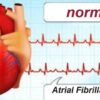There are various reasons for experiencing symptoms of chest pain and shortness of breath, but in most cases, they stem from lung conditions or heart failure, leading to improper blood circulation.
Usually, the underlying causes may not be severe issues, but these signals should not be ignored, as some of the causes can lead to chronic conditions. Possible causes of shortness of breath, chest pain:
Coronary Heart Disease
Impaired circulation, where blood accumulates on the inner surface of the coronary arteries, is caused by coronary artery disease or atherosclerosis. Coronary arteries play a crucial role in drawing blood from the lungs to the heart.
With atherosclerosis, they narrow, obstructing the normal flow of blood. The disease arises due to damage to blood vessels from high levels of cholesterol, blood fats, smoking, uncontrolled diabetes, and high blood pressure. The primary sign is chest pain and tightness, along with difficulty breathing. Gradually, the pain may radiate to the neck, shoulders, back, and jaws.
Pneumonia
In pneumonia, inflammation of the lungs occurs due to pneumococcal infection. Symptoms include difficulty breathing, cough, chest pain, sputum, muscle pains, fatigue, and sweating. Bacterial and fungal pneumonia can be effectively treated with antibiotics.
Heart Attack
Usually, a heart attack results from a blockage of blood supply to the heart, leading to a lack of oxygen delivery. The blockage is typically caused by a thrombus in the coronary artery.
In some cases, it can be triggered by sudden or prolonged physical or emotional stress. The most significant symptom remains chest pain and shortness of breath, sweating, restlessness, cough, dizziness, rapid heartbeat. In case of such symptoms, urgent medical assistance is needed, and immediate consultation with a doctor.
Preventive measures for shortness of breath and chest pain and their causes:
Avoid irritation of the respiratory tract
During weather changes, susceptible individuals should avoid contact with respiratory irritants by using air conditioning. Avoid vapors from strongly smelling paints, deodorants, or perfumes, and other potential respiratory irritants. Maintain the room temperature slightly lower than the surrounding environment in warm weather to avoid stuffiness in the room, which causes shortness of breath.
Use a fan
Use a fan, directing it towards the face. This is very useful for those who suffer from shortness of breath most often during sleep. In winter, use air humidifiers, as dry air is a cause of mucus secretion.
Get rid of mucus
When a person feels that mucus has accumulated in their lungs, they try to get rid of it by strong coughing. Take a deep breath before coughing. Coughing is a way to get rid of a large accumulation of mucus in the lungs. In addition, you can take various fluids to liquefy the mucus and make it easier to expel. Hot chicken broth is the best way to relieve chest congestion caused by accumulated mucus.
Breathe fresh air in the morning and evening. Fresh air will make breathing easier, help overcome any shortness of breath associated with shortness of breath.
Black coffee for asthmatics
One or two cups of black coffee provide relief from shortness of breath in asthmatics if an inhaler is not available. Caffeine contained in coffee is similar to compounds present in asthma medications necessary to remove mucus and stop shortness of breath. But do not use coffee as a regular asthma treatment, as regular coffee consumption can lead to increased blood pressure and heart rate.






